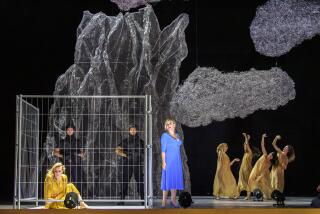Review: In a fantastic ‘Covid fan Tutte,’ Salonen ushers Mozart into the age of coronavirus
Finnish National Opera is back in business. The company took advantage of Helsinki’s admirable control of the coronavirus and in September began presenting live opera and dance in full productions with a live, distanced audience and some starry performers, the soprano Karita Mattila included.
This has included a new production now being streamed for free on Opera Vision. The titles come on for “Valkyyria” — a new production of Wagner’s “Die Walküre” — but the first thing you hear is what sounds like an audience coughing up a storm. Already, you know we’re in trouble. The storm music for the prelude packs a punch, but then a disgruntled customer “interface manager” steps in.
“Hey, little guy down there,” she yells at the conductor in the pit. “Stop it with Wagner! Play Mozart!”
The little guy happens to be Esa-Pekka Salonen (whose “Walküre,” postponed in the spring, is now set for January). The Mozart is “Covid fan Tutte,” an outrageous operatic spoof of “Cosi fan Tutte.” With spikes of COVID-19 the world over, this is clearly no time for a kidding around. Or is it?
That depends on who’s kidding whom. And how. And why. And the music!
In all of the above, this brilliant and, believe it or not, at times transcendent Mozartean spoof is unlike anything else that the coronavirus has wrought. We laugh at ourselves in our pandemic befuddlement, and in so doing we also hold ourselves up to the Mozart of his most probing, most troubling opera.
In Mozart’s comic operas, humor is used to break down our defenses. “Cosi fan Tutte” is the opera in which we have to stop kidding ourselves about who we are. It is the farcical opera exposing, through a sublime Mozartean lyricism, a rawness and richness of feeling that was entirely new to the lyric stage.
“Covid,” of course ain’t “Cosi,” nor does it try to be. Nothing of the original Da Ponte libretto is retained in an exceedingly clever, occasionally goofy, new adaptation by Minna Lindgren. Musical numbers are taken as needed, as well as two inspired bits from “Don Giovanni” and “The Magic Flute.” COVID restrictions keep “Covid” to under two hours, without intermission.
The many jobs of the interface manager, drolly acted by Sanna-Kaisa Palo, are to push recalcitrant Wagnerian singers around and vamp for time during set and costume changes. Other characters retain only the names and vocal categories of their “Cosi” counterparts. Rather than a pair of soldiers wagering with an old philosopher over the fidelity their lovers, they are bureaucrats getting dressed one early spring morning while hearing strange news from China.
“It can’t be true,” they sing in Finnish to the opening duet in “Cosi.” “Things like that never come to Finland.” Herd immunity seems their cavalier only option. Not a nationwide lockdown.
They learn otherwise, obviously. Their lovers are government ministers, whose Marimekko shopping is interrupted by the virus. Mattila’s Despina is a flamboyant diva indignant over having to return home from canceled glamorous European engagements.
Coronavirus may have silenced our symphony halls, taking away the essential communal experience of the concert as we know it, but The Times invites you to join us on a different kind of shared journey: a new series on listening.
There is no end to the tomfoolery. Coronavirus clichés and frustrations get merciless workouts. Masks, no masks. A guest on “Late Night With Tamino” struggles to sing through his mask as Papageno must when his lips are locked in “The Magic Flute.” Don Giovanni’s million sexual conquests are now 700 cases in Bergamo, 4,000 in Germany and enough in the Alps to make it a hot spot, from which Finnish skiers will bring home the virus.
Hucksters sell toilet paper on TV Shoppi. Mattila is at her most hilariously sensational in a no-quarantine-for-grannies skit. Refusing to be locked up and fed up with the evil looks wherever she goes as a “70-plus,” she says the hell with celibacy, and she pole dances. But also there is the altogether touching tenor at his mother’s window with cake and a rose.
Mozart fits every situation like a glove. Finnish vowels sing well, and the all-Finnish cast, the orchestra and Salonen are consistently exceptional. The humor remains self-deprecatory. The satire — some Monty Python, a little “Saturday Night Live,” a whiff of Borat, a welcome boatload of P.D.Q. Bach’s “The Abduction of Figaro” — rises to a more substantial theater of the absurd. Then, thanks to Mozart’s music, it turns into the absurdity of life as it is.
By the end, this is “Cosi” 2020. Mozart’s music sees through our façade and cover-ups. The coronavirus becomes personified as a stealthy dancer. The kidding in the “Covid” finale, following the example of “Cosi,” becomes, in the way that has always made Mozart matter, caring.
Many opera companies are attempting to come to coronavirus terms with our crazy times. Over the past weekend, Houston Grand Opera streamed a likable diversion, “Vinkensport, or The Finch Opera,” by composer David T. Little and librettist Royce Vavrek, which took one’s mind off the things for an hour. Boston’s White Snake Projects earnestly experimented with operatic melodrama in its “Alice in the Pandemic” stream. From Royal Opera in London came “New Dark Age,” a set of powerful short operas examining race and gender. Next month Pacific Opera Project will make its own version of “Covid fan Tutte,” unrelated to the Finns’, for a drive-in performance in Ventura.
For now, though, the Finns in their “Covid” set the Mozartean standard of turning laughter into earned tears.
More to Read
The biggest entertainment stories
Get our big stories about Hollywood, film, television, music, arts, culture and more right in your inbox as soon as they publish.
You may occasionally receive promotional content from the Los Angeles Times.








